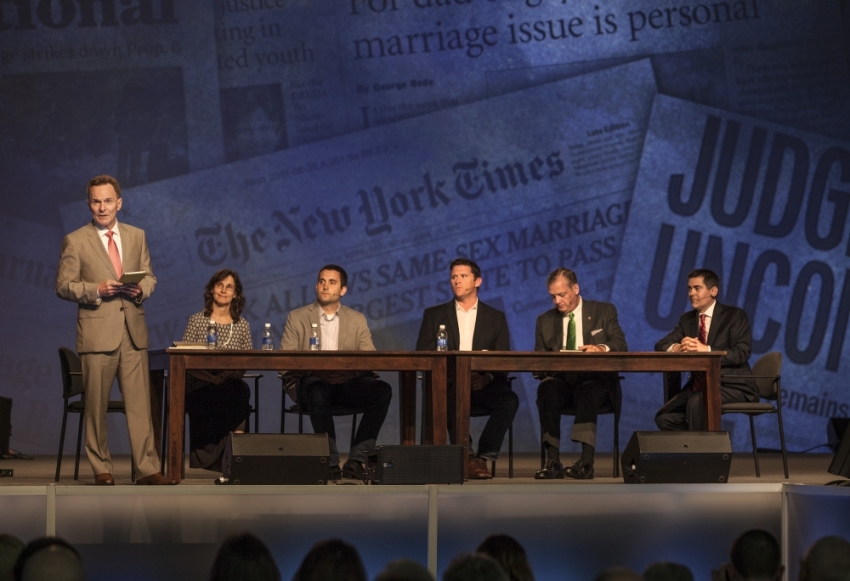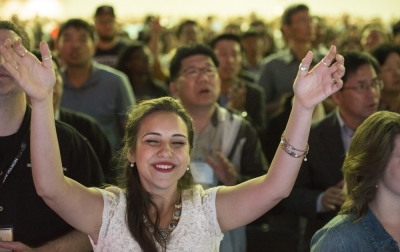Russell Moore to Parents: Don't Be Ashamed of Your Gay Kids, Don't Throw Them Out; That Is Pride

Failures of the Church to reach members of the LGBT community were highlighted at a Wednesday panel during the Southern Baptist Convention annual meeting in Columbus, Ohio.
Russell Moore, president of the SBC's Ethics & Religious Liberty Commission, advised parents to not throw their gay children out of the house. The sin of pride is what leads them to be ashamed when their children struggle with same-sex attraction, he explained.
"We need to equip parents not to be ashamed" of their gay, lesbian, transgender children, Moore said. "There are many parents who somehow feel, when they have gay, lesbian or transgender children, that somehow that's a reflection on them, that they didn't do something right, that everyone else in the community is talking about them. That is pride."
He then added that he can find no example in the Bible of a family without a prodigal.
"We do not turn around and repudiate our prodigals," Moore continued. "We speak truthfully to our prodigals and we keep a place for them to come home to in the end. Do not throw your gay and lesbian child out of the house. Be the sort of place where the Gospel is present."

Moore was speaking on a panel moderated by SBC President Ronnie Floyd, "The Supreme Court and Same-Sex Marriage: Preparing Our Churches for the Future." The panel also had author Rosario Butterfield, Ryan Blackwell, senior pastor of First Baptist Church of San Francisco, Matt Carter, senior pastor of Austin Stone Community Church, and Albert Mohler Jr., president of Southern Baptist Theological Seminary.
Butterfield delivered a message similar to Moore's. Formerly a lesbian and professor of English and women's studies, she spoke about how she became a Christian.
Butterfield was writing a book critiquing the Christian Right from a lesbian feminist perspective. In conducting the research, she befriended a pastor and his wife, and read the Bible seven times over two years. The friendship was important, she said, because her other encounters with Christians were street-corner preacher-types who didn't treat her with the same loving kindness.
She eventually realized, "I wanted Jesus" and "it was actually Jesus I had been persecuting the whole time. ... I couldn't know who I was without first knowing whose I was."
From her experience, she added, the LGBT community is better at doing community than the Church.
"The LGBT community is a real community," she said. When she was a lesbian "everyone's home in our community was open every night ... an open home with a meal and friendship was what stood between you and suicide, or you and boredom, or you and alcohol."
By contrast, she added, "often the Christian community looks very bounded and guarded, very rule driven, very inaccessible. ... Quite frankly, from my perspective, it has often seemed that Christians have just grown comfortable having a starvation diet of community. It's hard for starving people to have a meal. It just is."
Butterfield also cited 1 Corinthians 10:13, which says that when you are tempted God will "make a way to escape" (KJV).
"What if my home is a way of escape, but I'm too busy being concerned that there's cat hair on the couch? Right? Who cares? People are going to die of loneliness faster," she said.
Moore also told the gathering that their LGBT neighbors are not like the gay activists they see on television.
"Sometimes it's easy to see the people on television, the angry people, angry at us, and assume that's all that our neighbors, especially our gay and lesbian neighbors, are thinking. Most of our gay and lesbian neighbors are not like the people you see on television. They're not super villains in a lair somewhere seeking to destroy marriage or destroy us," Moore said.
He also urged empathy for the alienation felt by many gays and lesbians.
"They truly believe that having this right to marriage will give them what their parents or grandparents had. And many of them feel deeply alienated in American culture and they believe that [gay marriage] will somehow restore that. And so we need to understand that and know that," he said.



























